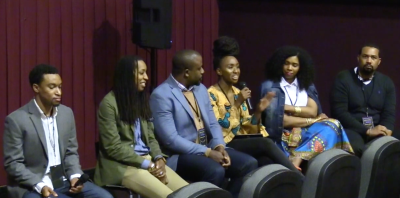Discussion Panel Reflects on Black Panther
Jun 18, 2018
This spring, CEISMC hosted a discussion panel called “Representation Matters: Black Images in STEM” that followed a screening of Black Panther at Regal Atlantic Station. Panelists hailed from a variety of fields, professional backgrounds and universities. They reflected on the film and discussed how figures in media can illuminate opportunities in STEM for young people.
Dr. Bettina Love, Associate Professor of Educational Theory and Practice at the University of Georgia, was one of the panelists.
“Black Panther gives us a place to imagine,” Love said during the event. “And our imagination is our way — our creativity is our way — to fight oppression.”
Audiences have praised Black Panther for its portrayal of Africans as scientific innovators. For example, the character Shuri is a young African woman and an accomplished inventor. She develops advanced technology, including the high-tech Black Panther suit worn by her brother T’Challa. The panel noted that representation through characters like Shuri fosters pride in African cultures and celebrates Black innovators in STEM.
Panel members also discussed how the film might have impacted them if it came out when they were in middle or high school. Hope Idaewor, a first year M.S. student in the Human Computer Interaction program at Georgia Tech, believes the story would have broadened her awareness of the creative aspects of STEM.
“[In middle school] I already kind of knew that I wanted to be in tech … but I never necessarily had a sense of assurance of the direction I wanted to go into,” Idaewor said. “I think this movie would have given me an interesting narrative of … what computer science can be: this kind of eccentric, playful, interesting space where you are allowed to explore different creative parts of computer science and technology.”
Idaewor, who moved to the United States from Nigeria when she was young, spoke about the impact the film might have had on her cultural identity. “Especially going through middle school and high school, there was a sense of negativity that came from my peers about being Nigerian and being from Africa,” she said. “I think [this narrative] would have definitely given me a stronger sense of identity — and also just a stronger ability to be confident in my culture and to celebrate my culture.”
The panel further discussed media as an influential tool that shapes how students view themselves and their peers.
“In the K-12 space or the K-7 space, children are highly impressionable,” said Dr. Diamond Jack, founding principal of Michael R. Hollis Innovation Academy. “They are going to determine what’s cool and what’s not based off of the models and off of the information that’s given to them.”
She believes the impact that the film has on adults will influence the ways in which they interact with children.
“Adults create the space and create the support … to push children to do what they think they want to do,” Jack said. “Adults understand the importance … of the pride we have [in our culture], and it’s starting to roll out into the classroom in terms of what we say to kids, how we teach the kids, and this pride about being African American.”
The panel demonstrated that representation on screens and representation in STEM do matter. Films like Black Panther generate meaningful conversations that are important steps to making STEM education accessible to all.
Written by: Rosemary Pitrone - CEISMC Communications



